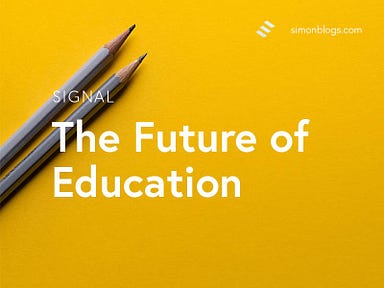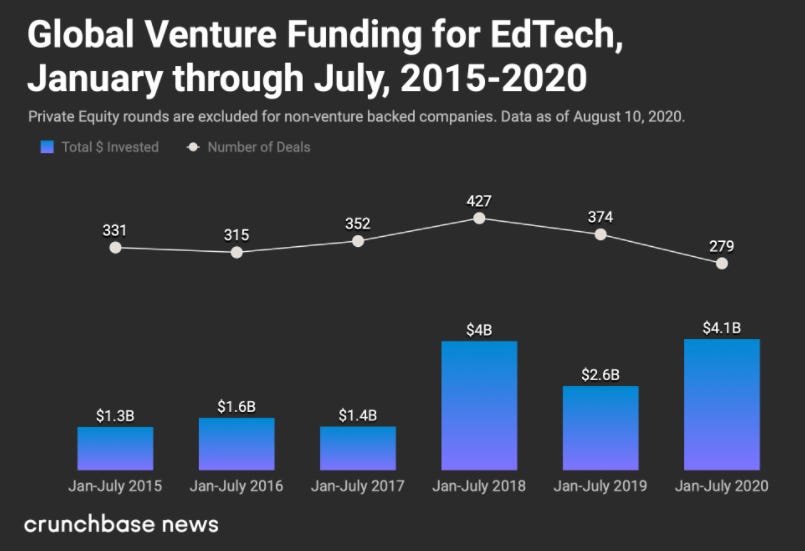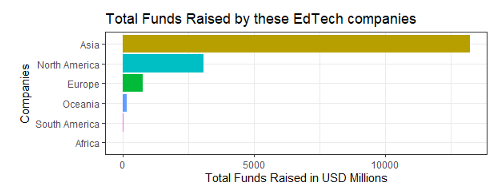👋 Hey Everyone - it’s been a while.
Thank you for your patience, and thank you especially to everyone who has reached out. We’ve had a ton of people join since our last issue went out - welcome to all the new subscribers.
We’re resuming our standard weekly schedule from this week onwards, with a bit of a twist.
We’re going to be changing things up a bit moving forward, and I want to get your feedback... My intention is to shift away from specific business ideas, more towards the future of different industries. It’s a bit more critical thinking-ish (?).
The idea behind it comes from a piece written by Paul Graham that I read a long time ago. The essay is about frameworks for coming up with startup ideas. One of the methods he mentions is to “live in the future”. That’s the direction I want this newsletter to be moving in.
I’m going to be diving into industries, exploring the players in those industries, macro and micro trends, and the movement of investors’ money. From that, we’ll be brainstorming ideas on how to take advantage of and monitor those incoming waves of change.
It’s going to be an evolving structure based on your guys’ feedback - let me know what you think of this first iteration by just replying to this email.
🧠 Genesis
// What’s the basis for this report?
The education system is broken.
We’re relying on a system that is designed to prepare people for a world that existed many years ago. More on the origins of education here.
The world has changed rapidly in the last 20, 15, and even 5 years. And the rate of change is only increasing.
It’s time our education system caught up.
🛑 Signals
// Trends & predictions giving context to the ideas that follow
Education is a global industry that is ripe for disruption.
The West is lagging the East in education innovation - especially cultural awareness (i.e. the East is much more aware and involved the in the culture of Western countries, than the West is in the East.)
Africa has a huge education shortage, but is also a largely untapped market. This is due to poor governance leading to funding shortages, and a language and culture barrier which means entry into the market is difficult. Poor governance in most countries also scares off potential investors.
As technology is taking over more and more jobs that humans used to do, companies are hiring people for who they are, and their ability to think in a way that no robot can. There is no degree that teaches innovative thinking as its main outcome.
Hiring is less about what you have on your CV, and more about how you can demonstrate the value you bring to the table.
Having the ability to solve problems and think critically is increasingly more valuable. More people just turn to Google for answers and as a result, innovation has slowed.
Not only are modern day curriculums lagging, but teaching methods are too. It’s a well known fact that different people learn better using different methods, yet we’re all still taught the same way.
As hiring remotely becomes a bigger trend, companies will have access to a wider array of talent. There is a problem that needs to be solved here with regards to “Minimum business acumen”. Essentially, a list of skills you should have, outside of your core competencies, in order to work here. Things like, basic financial education, business communication etc.
💰 Show Me the Money
// Where the money is moving in the industry
A lot of young companies:
479 Educational Technology (EdTech) companies have raised money in 2020 thus far.
Most of those (~320) were early stage or seed funding deals.
Most of those deals were originated in North America (~180).
Second to NA was Asia with ~150.
Third was Europe with ~110.
Most established companies come from Asia:
$5.6 Billion USD was invested in EdTech in 2020.
~$2.6 Billion USD of this went to Late Stage companies in Asia.
Compare this to the ~$600 Million USD that went to Late Stage companies in the US.
Looking at the total amount of funding raised by any company in the EdTech space who has raised money in 2020:
$17.3 Billion USD in total across these companies has been raised.
Around 74% of that went to Asia:
Notable Companies
Chinese homework tutoring app, Yuanfudao, has raised $2.2 Billion USD and is now worth an estimated $15.5 Billion USD. Since 2018, it has doubled its user base to 400 million users, with the majority of its revenue coming from online course sales.
BYJU, an Indian EdTech company offering “Comprehensive learning modules for grade 8’s to 12” has raised $622 Million USD at a valuation of $10.5 Billion USD.
Udemy was founded in 2010. It now has 150 000 courses, 42 000 instructors, 3.4 Million minutes of video content at an estimated valuation of $2 Billion USD.
More Reading:
VC’s Pour Funding into Edtech Startups as COVID-19 Shakes Up the Market [Techcrunch]
The 2019 EdTech Funding Breakthrough [Nix Software Engineering]
Yuanfudao Raises $2.2 Billion in New Financing [Yahoo! Finance]
8 edtech investors talk re-skilling, digital universities, ISAs and other post-pandemic trends [Extra Crunch]
💡 Ideas
// Ideas that you can use to take advantage of those changes
Lambda School Model
Lambda School is essentially a skill-advance model, for software developers. You only pay your fee’s when you’ve got a job. After that, you repay your education costs as a percentage of your earned income.
This does two main things:
Lowers the barrier to entry for those who don’t have access to it,
Shifts the goals of the educator to becoming output-based. The model only works when you are actually educating people who are getting employed.
Use this model and apply to other industries. One that comes to mind:
Kids that clearly don’t like formal education and are skilled practically and with their hands: Trade school (plumbers, electricians etc.)
Bolt-On Educational Onboarding
If we start moving to a segregated learning model where people learn in different “modules”, there may be a case where there is a loss of general knowledge about certain things that make joining a company helpful (examples below).
This would be a service that essentially provides modules that companies can pick and choose, which they would like all their new employee’s to be proficient in. Some examples:
Professional communication,
Self defence,
Mental health and agility,
Basic foreign languages (Example: If you deal with Mexican companies, then basic Spanish),
Basic mySQL database management.
“Find Out What You Like” Education
One of the most difficult decisions to make as a young adult is what to study. Often students get trapped in a degree or profession that they hate. That is largely due to the fact that courses are so inflexible at universities. Once you go down one road, changing to another is often nearly impossible, and it costs time and money.
And yet, so few people have any clue what they want to do with their lives after high-school.
This would be a service that essentially takes students down a “day in the life of” different professions. It could range from neuro-surgeons to vloggers. Each video series explores one profession, and you sell the full package/suite to students (or to educational institutions) as packages that the students can explore.
A series would include a real life look into their day to day (I see VR becoming a big part of this). Think of it like Masterclass for explaining a profession’s day to day.
Distribution for Teachers
Everyone remembers their most impactful teacher at school. Great teachers are hard to come by.
Traditional education limits their distribution. Currently, it is a one-to-x model where x is the number of students that a school can fit in a class.
As schools change and the education system is segregated, providing great teachers the ability to distribute their skills not only makes the profession more attractive (teachers are underpaid), but it also means teachers can focus on subjects that they want to teach, and niche down into them to become the best in their sector.
Udemy et al. already provide a marketplace for this. The solution would be providing a plug-and-play service that a teacher can simply and easily use to develop their own curriculum and then price, publish and monetize through a platform like Udemy, or other.
There is a big factor on which this ideas success hinges:
Making these modules and certain teachers “Verified” as being of value to certain employers: “Goldman Sachs values this module as an outcome for their Accounting Graduate programme”
Maas - Mentors-as-a-service
As there is a possibility that more and more students will choose to ‘outsource’ their education and get their skills and training from different sources around the world, it is possible that there will be a break down in human connection.
Remember that influential teacher I mentioned above? Their influence becomes reduced greatly when they aren’t able to observe and then affect students on a day to day basis. Online learning isn’t the same as in-person.
Maas would essentially provide that interaction. I’d describe the mentor as an independent “thought leader”. Their role would essentially be to foster the curiosity, brain and character of the individual.
I haven’t worked out the model of this yet, but I suspect it may take the form of a one-to-many counsellor which is complimented by additional media and content, and different pricing tiers based on the frequency of influence etc.
🚧 Barrier to Entry
// If you can overcome, or work around this, you’ll been on your way to success
The job market still relies on a specific set of certificates, degrees and qualifications as a stamp of approval to say you can enter into the (formal) job market.
This doesn’t apply everywhere, and we are seeing the trend change through industries where the reliance is not on qualifications, but an ability to demonstrate skill.
Software development is reaching that critical mass.
It is now no longer required that a developer has any qualification to start working for someone.
No one asks a plumber or for their certification. If they have a reputation of doing great work, that is all that matters.
How I’d Do It
The change needs to come from employers. They need to formally recognize the value in alternate education before any there will be any significant movement away from traditional schooling curriculums.
I would go about this with a waterfall approach, starting at the top with the employers.
Start in one industry. Choose one that lends itself to this. Something that is heavily reliant on performance based outputs in the workplace… like marketing and advertising.
Then find some prominent employers in the industry. Speak to them about what their ideal employee looks like. Encourage creative, free thinking.
Setup agreements with them for a delivery of a certain amount of these graduates per year. You will have to commit to a minimum quality threshold to keep them happy.
Once you have commitment from the top of the waterfall, you can then follow the stream down into the educational part. You could piece together courses and content from experts in the field from all over the world. To start, you could do it on a revenue share basis with the teachers, and as you grow you then bring them under contract and pay them for original work (or keep the revenue share model)
Then it is about recruitment and marketing. You have to sell the idea. One way to start is to guarantee a job straight after graduation. The other is to use the Lambda school pricing model.
The barrier to entry here is high, but the potential reward on the other side of the wall is massive.
🔰 The Start Line
// A low-friction first step you can take to pounce on this trend
Keep an eye out for industries that are very reliant on performance, and not very reliant on qualifications.
Then look at the education for these industries, how do universities/tertiary education systems teach these students. Can it be done better?
My first steps would be a slightly modified approach to what I mentioned above. I’d go to potential employers in this industry and ask them what skills are missing when most graduates arrive at their doors.
I’d then create or collate content for those skills and sell them as a package to those potential employee’s.
From there, you will build an audience and rapport with the employers and can get started on the waterfall approach mentioned above.
📣 What’s-a-Twitter
// The tweet of the week, from someone I follow over at @simon_blogs
Greg Isenberg on getting crystal clear on things:
🖱️ Clickworthy
// Valuable tidbits from around the interweb
🐔 One of the most difficult challenges to solve in marketplace businesses is the chicken-or-the-egg problem of trying to match the demand and supply side of the marketplace. Here’s how Jonathan Williamson solved the problem and went on to create a $500k/month marketplace.
📷 How to build backlinks and improve your SEO rankings using Unsplash.
🗣 The difference between real and generic marketing.
❕ Along the lines of what we spoke about surrounding hiring people for their uniqueness, not their degree/qualifications; here are two pieces about standing out from the crowd, and making the most of your uniqueness: How your unique story can get you hired, and Finding Your Real Self
👋 The End Notes
I hope this was valuable. If it was, consider sharing it with a friend:
If you’re the friend who got this shared with you, you can sign up here:





